|

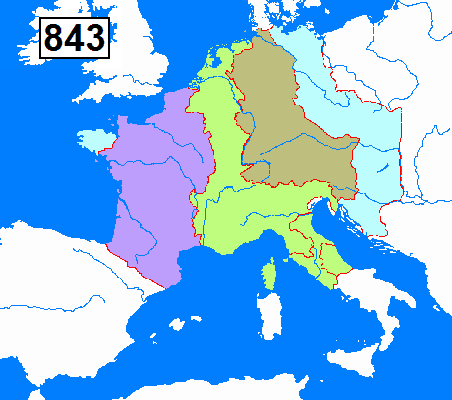
 = West Francia (Charles the Bald)
= West Francia (Charles the Bald)
 =Middle Francia (Lothair I)
=Middle Francia (Lothair I)
 = East Francia (Louis the German)
= East Francia (Louis the German)
 = Loosely held territories
= Loosely held territories
Apart from a successful insurrection by the Basques, attacks from Vikings
and Arabs, and that Benevento definitely had slipped out of Frankish
control, the Empire of Charlemagne was still intact until 843. South of
Bavaria, direct rule over the Slavic principality of Karantania had been
introduced in 828. Charlemagne himself had intended to divide his empire
between his sons but only one of them, Louis the Pious, was alive when he
died 814. Louis the Pious inherited the entire empire except Italy which
was ruled by his nephew Bernhard, but Louis defeated him in 818. Unlike his
father, Louis wanted to preserve the unity of the Frankish Empire.
His younger sons were given kingdoms of their own, but they had to acknowledge
their elder brother Lothair’s overlordship as Roman emperor. These vassal
kingdoms were Aquitaine (Pepin) and Bavaria (Louis the German), both of them
created in 817. A third kingdom (Swabia) was created in 829 to the youngest son
Charles the Bald. The arrangement with the younger brothers having to be vassals
to the eldest brother was a clear break against the Frankish tradition and
civil war between the three surviving brothers broke out when Louis the
Pious died in 840. The civil war resulted in the treaty of Verdun in which the
Frankish empire was divided into three parts, Lothair got the middle
kingdom and kept the title of emperor but without overlordship over his
brothers. Pepin had died in 838 and his son Pepin II fought in vain to hold
on to his father's kingdom of Aquitaine. He was finally defeated in 852.
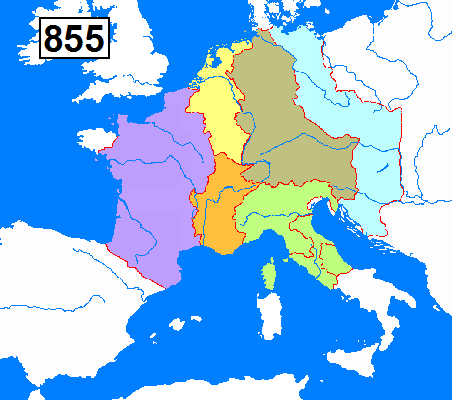
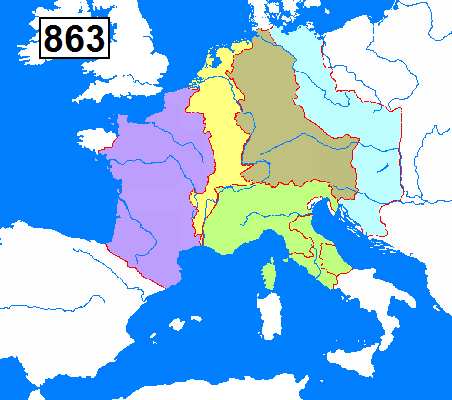
 = West Francia
= West Francia
 = Lotharingia
= Lotharingia
 = Provence
= Provence
 = Italy
= Italy
 = East Francia
= East Francia
 = Loosely held territories
= Loosely held territories
Charles the Bald had in 846 been forced to recognise Brittany's independence.
Lothair abdicated in 855 and entered a monastery where he died five days
later. His kingdom of Middle Francia was divided between his three sons. The
eldest son Louis II had already become king of Italy in
844, the younger sons Lothair II and Charles got Lotharingia and Provence
respectively. The imperial title
was linked to the kingdom of Italy. Charles died in 863 without sons and his
kingdom of Provence was divided between his brothers.
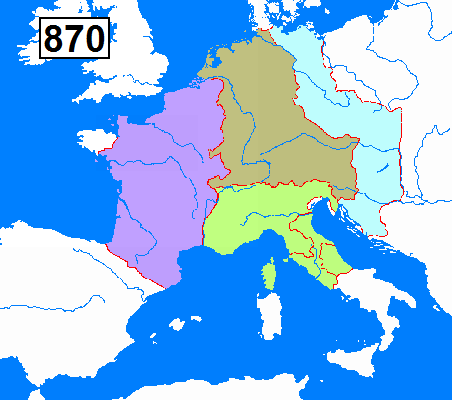
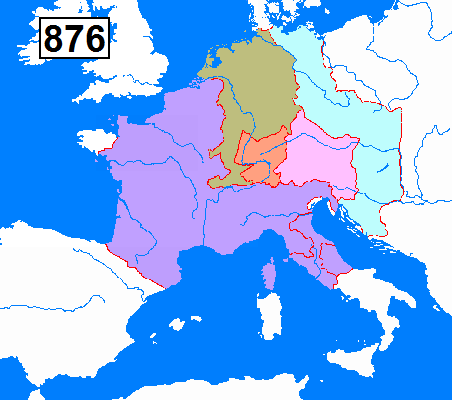
 = West Francia
= West Francia
 = Italy
= Italy
 = East Francia
= East Francia
 = Swabia
= Swabia
 = Bavaria
= Bavaria
 = Loosely held territories
= Loosely held territories
Lothair II died in 869 without sons and Charles the Bald of West Francia
tried to annex his kingdom. That was however not accepted by East Francia’s king
Louis the German who attacked Charles. The conflict was resolved with the
treaty of Meersen 870 in which Lotharingia was divided between them. Louis
II of Italy also died without sons in 875 and Charles the Bald quickly
installed himself as emperor there. Louis the German died the following
year and his kingdom was divided between his three sons Carloman
(Bavaria), Charles the Fat (Swabia) and Louis the Younger (the rest of
East Francia).
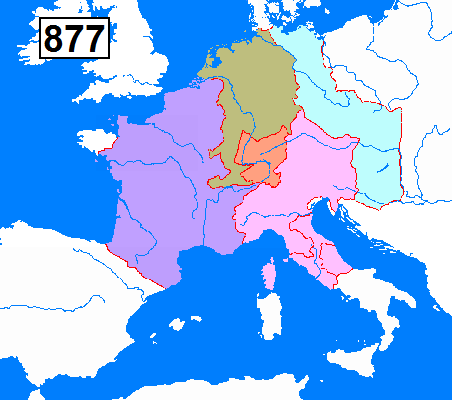
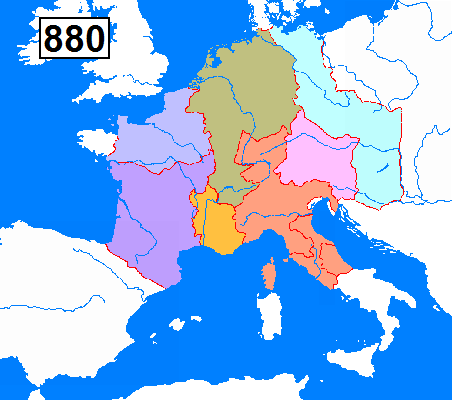
 = West Francia
= West Francia
 = East Francia
= East Francia
 = Loosely held territories
= Loosely held territories
 = Charles' kingdom
= Charles' kingdom
 = Carloman's kingdom
= Carloman's kingdom
 = Provence
= Provence
 = Neustria
= Neustria
After the death of Charles the Bald in 877 West Francia was inherited by his
son Louis the Stammer. Italy however went to Carloman of Bavaria. The
Byzantine empire reinstated its supremacy over Croatia the same year.
That land had previously been a part of the
Frankish kingdom although it in practise was an independent state. With
the death of Louis already in 879, West Francia was plunged into
a crisis. Louis’ two sons divided the kingdom between themselves but their
legitimacy was disputed and count Boso was elected king in Provence by the
local nobles. In Italy Charles the Fat replaced Carloman as king, the latter died
shortly afterwards. Louis the Younger of East Francia then inherited Bavaria.
The conflict between East and West Francia was resolved in 880 with the treaty
of Ribemont whereupon Louis the Younger also added the western part of Lotharingia
to East Francia.
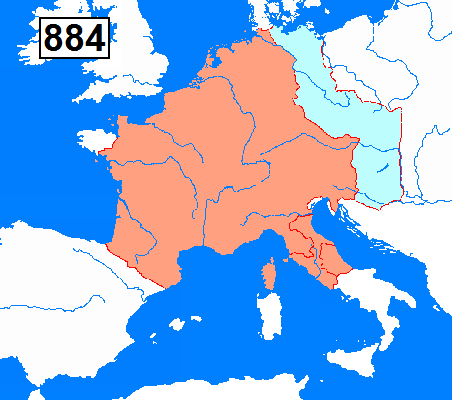
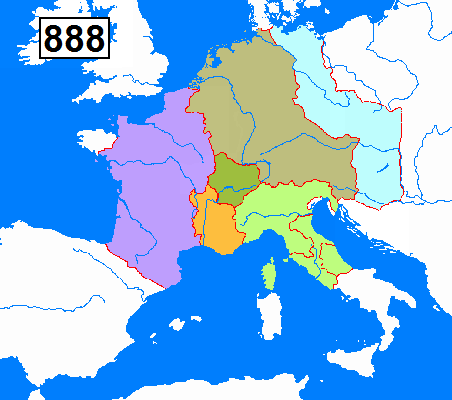
 = West Francia
= West Francia
 = East Francia
= East Francia
 = Loosely held territories
= Loosely held territories
 = Charles' kingdom
= Charles' kingdom
 = Italy
= Italy
 = Provence
= Provence
 = Juran kingdom
= Juran kingdom
Additional early deaths occurred in 882 and 884 so that Charles the Fat inherited
first East Francia and then West Francia. The kingdom of Provence had in 882
been forced to recognise Charles’s supremacy. This meant that the Frankish
Empire had, just like many times before, been reunited. But the unity was to
be short lived because the Empire was ravaged by attacks from Vikings and
Charles was not suitable as a war leader. The German dukes deposed him in 887
and if he had not died 888 it is likely that he would have suffered the
same fate in the other parts of the Empire. The Germans had elected his
illegitimate nephew Arnulf of Carinthia as new king but the other parts of
the Frankish Empire elected local nobles as their kings. In West Francia
count Odo was made king thanks to his heroic defence of Paris against the Vikings a
few years earlier. In Italy Berenger I was elected king and a son to Boso
became king of Provence (Lower Burgundy).
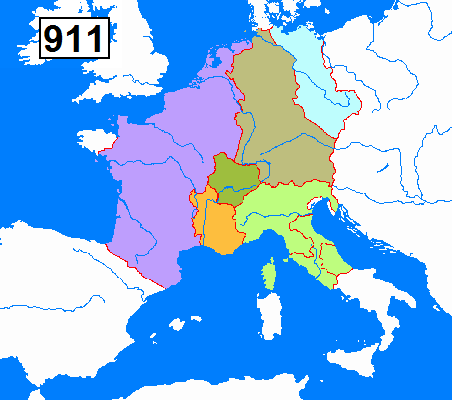
 = France
= France
 = Provence
= Provence
 = Juran kingdom
= Juran kingdom
 = Italy
= Italy
 = Germany
= Germany
 = Loosely held territories
= Loosely held territories
The events of 887-888 meant the final dissolution of the Frankish Empire.
Unlike previous divisions that had occurred as a result of inheritance,
this one was the result of elections in the Frankish part kingdoms. It was
no longer enough that collateral branches of the royal dynasty became
extinct for the Frankish kingdom to be reunited, instead it was necessary
that the local nobles in every kingdom elected the same king, and that was
something they did not have any interest in doing. But the belief that
the Frankish Empire still existed lived on because the Carolingian dynasty
still ruled East Francia and from 898 also over West Francia. But when the
last East Francian Carolingian died in 911 only Lotharingia followed the
Frankish tradition and joined West Francia, the other four duchies elected
a new king from their own rank. This event confirmed that the Frankish
Empire was no more and that East Francia had been replaced by a German
kingdom. East Francia had before that also been reduced in the east when
the Hungarians conquered a large territory. Because West Francia was the
only remaining part of the Carolingian empire, after 911 it became France.
Return to the first page |

